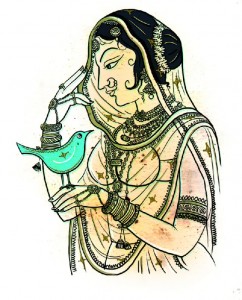Eons ago, lured into a game of dice, the Pandavas lost all their wealth and liberty at the hands of the wily Shakuni and the Kaurava Prince Duryodhana. Intoxicated with power, Duryodhana ordered his brother Dushashana to disrobe the Pandava queen Draupadi in full public view, so to forever shame the Pandavas. A distraught Draupadi, on finding no aid from her enslaved husbands or the courtiers, used telepathy to call upon Lord Krishna, who she considered as her brother, to come to her aid. Needless to say, Krishna did, and so the honor of the Pandavas was saved. Luckily for Draupadi, she had direct connect with someone who could help her out in times of distress.
That was not the case with Ritra Jain, recently. To be fair, Ritra’s case was much different. Impressed by the glitzy looks, she had purchased a sleek BlackBerry device, only for it to conk off almost the next day. After much followups with the retail outlet and the company, a saddened Ritra, as a last resort, opened her Twitter account and punched in her sorrows. All that she wanted do was share views with her friends, get some sympathies and possibly forewarn followers against what she deemed as unsatisfactory service by the company. Much to her surprise, within an hour of her sad tweet, she recieved a call from the BlackBerry firm, asking about her issues with the phone and troubleshooting them. In a day’s time, a BlackBerry representative visited her, took the handset, had it repaired and subsequently returned. Twitter empowered Ritra, much like telepathy did Draupadi.
next day. After much followups with the retail outlet and the company, a saddened Ritra, as a last resort, opened her Twitter account and punched in her sorrows. All that she wanted do was share views with her friends, get some sympathies and possibly forewarn followers against what she deemed as unsatisfactory service by the company. Much to her surprise, within an hour of her sad tweet, she recieved a call from the BlackBerry firm, asking about her issues with the phone and troubleshooting them. In a day’s time, a BlackBerry representative visited her, took the handset, had it repaired and subsequently returned. Twitter empowered Ritra, much like telepathy did Draupadi.
What surprised Ritra most was the sheer alarcity with which the company responded to her tweet, when all the correspondence to customer care fell on deaf ears. She should not be, because like many other companies, BlackBerry is very active in ORM or Online Reputation Management. Simplistically speaking, it is akin to brand management in cyberspace, ensuring that nothing untoward is spoken, the customers are happy and all is hunky-dory.
With Google these days now showing social media results on the search page, even incongrous tweets and Facebook update have become very critical for any brand. These days, more damage can be done by a disgruntled customer through social media than anything else. And companies are well understanding the same. Take for instance, when the Gulf of Mexico spill took place, there was a strong campaign on FaceBook calling on people to ban BP. Even tech giant Intel was attacked by activists opposed to minerals mining in the Congo with a vociferous campaign. Recently, Nestlé had to bear the brunt from Greenpeace for using palm oil from companies that were trashing Indonesian rainforests through social media.
In all these instances, the companies were caught off-guard and did not know what to do. The power of the Web, (with over 1.2 Billion users – that is 1/6th of the global population) cannot be overestimated. With Twitter and FaceBook connecting millions multiple times in a day, even a small grouse can create a big cloud of negativity. A layman no longer needs to know any higher-ups in the company to get things sorted; all he or she needs is a good following on Twitter or Facebook to get the company to hear him out.
Come to think of it, were a current Duryodhana stupid enough to set out on a similar misadventure with a tech-savvy Draupadi, I am sure it will be a tweet this time, which would read something like this, “#Duryodhana wishin 2 disrobe, Krsna need help URGENT! Do plz kck his *^%&.”
